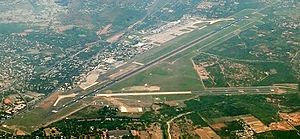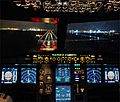Runway facts for kids
A runway (also called RWY for short) is a special strip of land at an airport. It's where aircraft like planes can take off into the sky and land safely. Runways can be made by people using materials like asphalt (like roads), concrete, or a mix of both. Some runways are even natural, made of grass, dirt, or gravel.
Contents
What are the Main Parts of a Runway?
Runways are carefully designed with different sections to make sure planes can take off and land safely. Here are the main parts you might see:
Understanding the Runway Safety Area
The Runway Safety Area is a clear, smooth space around the main paved runway. It's kept free of anything that could get in the way of a plane, whether it's flying or moving on the ground. Think of it as a safety zone!
What is the Runway Surface?
The Runway itself is the main paved area where planes actually take off and land. It stretches from one "threshold" (start line) to the other. You'll often see special markings on it, like numbers, lines down the middle, and other symbols that help pilots.
What are Blast Pads and Overrun Areas?
Blast pads are also known as overrun areas or stopways. They are often built right before the start of a runway. Large planes create a lot of powerful air (called "jet blast") when they start to take off. Without blast pads, this strong air could wear away the ground and damage the runway.
Overrun areas are also found at the end of runways. They act as an emergency space. If a plane lands and goes a bit too far, or if a pilot decides not to take off at the last minute (a rejected takeoff), this area helps the plane slow down safely. Blast pads are usually not as strong as the main runway and are marked with yellow arrow-like shapes called chevrons. Planes are not allowed to taxi (move slowly), take off, or land on blast pads unless it's an emergency.
What is a Displaced Threshold?
A displaced threshold is a part of the runway that planes can use for taxiing, taking off, and slowing down after landing. However, they are not allowed to touch down (land) on this specific section.
Why would a runway have a displaced threshold? Sometimes, there are obstacles (like buildings or hills) just before the runway, or the runway surface might not be strong enough in that first section. Noise rules might also mean planes can't land right at the very beginning. A displaced threshold is marked with white arrows that point towards the part of the runway where planes are allowed to land.
Images for kids
-
A runway sign at Madrid-Barajas Airport, Spain
-
A night view of a runway from an A320 cockpit
-
An Approach lighting system at Berlin Tegel Airport
-
A Mahan Air Airbus A310 using reverse thrust in rainy weather at Düsseldorf Airport
-
The grass airstrip on the Badminton estate, Badminton, South Gloucestershire, England. This strip is very simple, with no lighting or special aids.
See also
 In Spanish: Pista de aterrizaje para niños
In Spanish: Pista de aterrizaje para niños














